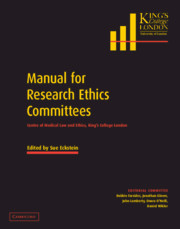Book contents
- Frontmatter
- Contents
- Editorial board
- Acknowledgements
- List of contributors
- Introduction
- Part I
- 1 The ethics of clinical research
- 2 Research ethics committees and the law
- 3 The regulation of medical research: a historical overview
- 4 The regulation of medical research in the UK
- 5 Observational and epidemiological research
- 6 Social survey research
- 7 Approaching qualitative research
- 8 Complementary and alternative medicine: challenges for research ethics committees
- 9 The ethical review of student research in the context of the governance arrangements for research ethics committees
- 10 The ethics of genetic research
- 11 Research or audit?
- 12 Randomised controlled trials
- 13 Determining the study size
- 14 Risk assessment for research participants
- 15 Absorbed radiation in patient and volunteer studies submitted to the ethical committee: a memorandum
- 16 A guide to the use of radioactive materials and radiological procedures for research purposes
- 17 Indemnity in medical research
- 18 The prevention and management of fraud and misconduct: the role of the LREC
- 19 Understanding clinical trials: a model for providing information to potential participants
- 20 The law relating to consent
- 21 Writing information for potential research participants
- 22 The law relating to confidentiality
- 23 Research involving vulnerable participants: some ethical issues
- 24 The ethics of research related to healthcare in developing countries
- Part II
- Index
20 - The law relating to consent
Published online by Cambridge University Press: 08 January 2010
- Frontmatter
- Contents
- Editorial board
- Acknowledgements
- List of contributors
- Introduction
- Part I
- 1 The ethics of clinical research
- 2 Research ethics committees and the law
- 3 The regulation of medical research: a historical overview
- 4 The regulation of medical research in the UK
- 5 Observational and epidemiological research
- 6 Social survey research
- 7 Approaching qualitative research
- 8 Complementary and alternative medicine: challenges for research ethics committees
- 9 The ethical review of student research in the context of the governance arrangements for research ethics committees
- 10 The ethics of genetic research
- 11 Research or audit?
- 12 Randomised controlled trials
- 13 Determining the study size
- 14 Risk assessment for research participants
- 15 Absorbed radiation in patient and volunteer studies submitted to the ethical committee: a memorandum
- 16 A guide to the use of radioactive materials and radiological procedures for research purposes
- 17 Indemnity in medical research
- 18 The prevention and management of fraud and misconduct: the role of the LREC
- 19 Understanding clinical trials: a model for providing information to potential participants
- 20 The law relating to consent
- 21 Writing information for potential research participants
- 22 The law relating to confidentiality
- 23 Research involving vulnerable participants: some ethical issues
- 24 The ethics of research related to healthcare in developing countries
- Part II
- Index
Summary
General principles: treatment
Consent and battery
In general, medical treatment may only be given lawfully to a patient with that patient's consent. A doctor who acts without a patient's consent risks criminal prosecution for assault or, more likely, being sued for damages in the tort of battery. A signed consent form is only evidence (not conclusive) that a patient has given consent to a treatment. It is the reality of the patient's consent which is the concern of the law (Chatterton v. Gerson [1981]).
Exceptionally, medical treatment may be given without consent where the patient is unable to consent, for example, where the patient is unconscious in an emergency or where the patient is permanently unable to consent through mental disability and the treatment is reasonably necessary in that patient's best medical interests (Re F (A Mental Patient: Sterilisation) [1990]).
A valid consent in law requires three elements:
(i) the patient must be competent to consent;
(ii) the consent must be based upon adequate information;
(iii) the consent must be voluntarily given.
Competence to consent
A patient will be competent to give consent if he or she is capable of understanding what is involved in the medical treatment, including the procedure itself, its consequences and the consequences of non-treatment.
An adult patient (i.e. has attained the age of 18) will usually be presumed to be competent to understand a medical procedure unless there is good reason to doubt it, for example, if he or she is mentally ill, mentally disabled or affected by external factors such as drugs, alcohol, extreme pain, panic or shock.
- Type
- Chapter
- Information
- Manual for Research Ethics CommitteesCentre of Medical Law and Ethics, King's College London, pp. 89 - 95Publisher: Cambridge University PressPrint publication year: 2003

